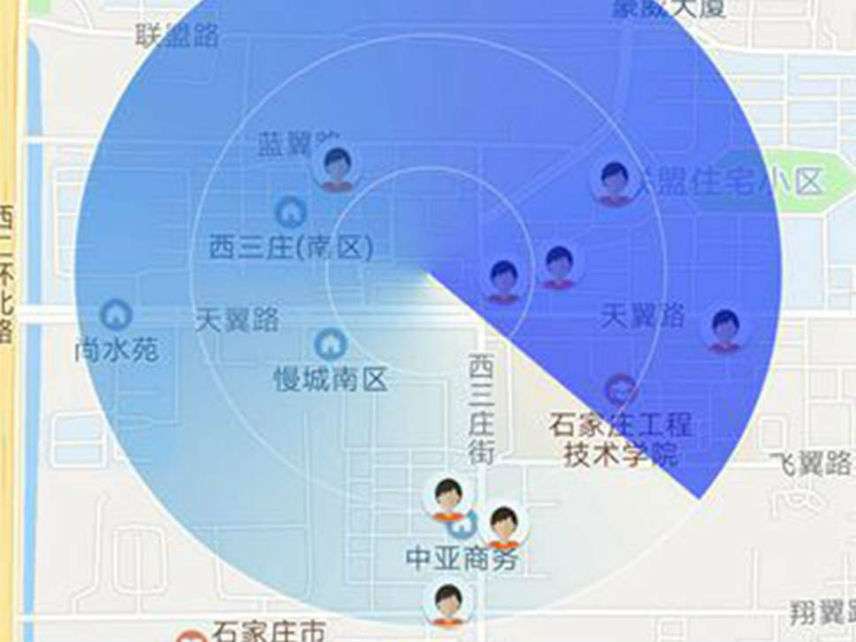New Chinese App Lets Users ID Debtors Lurking Nearby
How would you like it if nearby strangers could instantly access your credit score on their phones?

If you're the sort of upstanding citizen who always wants to know if some deadbeat debtors happen to be lurking nearby, then there's good news—at least if you live in China's Hebei province. Last week the Higher People's Court of Hebei introduced a mini-program on WeChat messaging, social media, and mobile payment app targeting "debt dodgers." The app, dubbed a "deadbeat debtors map," enables users to identify and locate any debtors who come within 500 meters. Specifically, it identifies people who have been failing to pay such legal obligations as court-imposed fines, divorce settlements, rent, and loans.
Why publicly expose debtors to public view? The People's Court Newspaper explains the thinking: "With the development of economy and the convenience of transportation, people's travel and mobility costs are lower, and there are more opportunities for people to evade responsibility for their debts. Once a discredited debtor leaves his original working life circle to live in other places, he basically does not feel the moral pressure from the society of acquaintances to honor his debts."
Deploying the debtor map app, the People's Court adds, "is equivalent to constructing a 'quasi-acquaintance society' by technical means, and solving the problem of 'moral pressure' in a society of strangers. Thus debtors will be forced to fulfill their obligations as soon as possible, no longer getting away with being deadbeats."
The new app is part of the rollout of China's Social Credit System, which aims to track and report the "trustworthiness" of every citizen by 2020. So far, the Social Credit System does not assign an easily accessed three-digit trustworthiness score to each citizen, as some media outlets have reported. But as the Hebei debtor map app indicates, various localities are experimenting with combinations of private and public social scoring.
The Nation reports that the city of Rongcheng has implemented probably the most thoroughgoing version of a Social Credit System so far. Citizens of Rongcheng earn or are docked points from their initial assignment of 1,000 points for engaging in various activities that result in social credit grades ranging from A+ to D. Not stopping for pedestrians in a crosswalk results in a loss of five social credit points, for example; graffiti hostile to the government forfeits 50 points. Helping a neighbor prune a tree or get his car out of a ditch earns the do-gooder a point. Citizen activities are monitored and enforced by a extensive system of surveillance cameras. According to The Nation, some neighborhoods "already have a social-credit square where bright billboards show details of the commands and pictures of citizens who have won or lost points during the past month." Talk about constructing a "quasi-acquaintance society" by technical means!
In addition to the public shaming, blacklisted citizens with low social credit scores are banned from booking rooms in hotels, registering their children for good evening classes, or buying tickets for high-speed trains or air travel for a year. Low-scoring companies are banned from responding to calls for tender offers.
None of us have never done something of which we are now ashamed. Would you like to live in a world where random strangers nearby can click on an app that instantly reports your dumbest and most embarrassing past blunders? I wouldn't.
But many Chinese say they appreciate the ways the nascent Social Credit System forestalls fraud and encourages people to behave better in public. A 32-year-old Rongcheng entrepreneur named Chen tells Foreign Policy that "people's behavior has gotten better and better. For example, when we drive, now we always stop in front of crosswalks. If you don't stop, you will lose your points." He adds: "At first, we just worried about losing points, but now we got used to it."
Recent polling data suggests that the Social Credit System has been popular with most Chinese citizens so far. So let's end on a disquieting question: How many Americans would be similarly willing to surrender the liberty and pleasures of public anonymity in exchange for a bit more public order?


Show Comments (56)